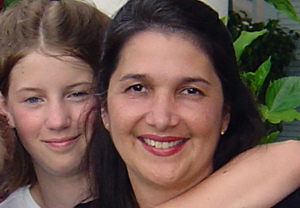 Name: Carmen Simpson
Name: Carmen Simpson
Home State: Ohio
Carmen has been participating in medical research into Premature Ovarian Failure (POF)
since 1988.
Why? “When I was diagnosed there many more unanswered questions than answers. I hoped through NIH I would have a better understanding of what POF was and my participation might help lead to a cure.”
Carmen’s story:
“Imagine how insane you feel when you seem to be going through menopause at the age of 22—especially when you go to professionals and they don’t believe you,” says Carmen Simpson, who was in the military when she experienced her first symptoms. “I knew there was something really wrong, but I was misdiagnosed for years. It got so bad that my doctors sent me to a psychiatrist. They thought I was a hypochondriac.” Finally a blood test revealed that she had Premature Ovarian Failure, or POF. Her doctors referred her to the NIH, where physician Larry Nelson told her she was not alone — more than half of the women with POF see three different doctors before somebody does the crucial blood test.
Nearly 250,000 American women suffer from the rare disease’s symptoms — absent or irregular periods, hot flashes, infertility, irritability, and poor concentration. Nelson, who has been studying POF at the National Institute of Child Health and Human Development (NICHD) for 18 years, has been working to better understand the type of ovarian failure that occurs when the immune system of young women attacks their egg–producing machinery. He and his colleagues are studying a similar problem in mice and are trying to find the mechanism in humans. They know that the disorder causes the ovaries to prematurely stop producing eggs, cutting off the hormones needed for bone strength and to ward off heart disease. And they have learned that women with POF should be screened with a simple test for Addison’s disease, because they are 300 times more likely than others to develop the potentially fatal adrenal insufficiency.
Early diagnosis and treatment are vital, says Nelson. “When dealing with osteoporosis, an ounce of prevention is worth a pound of cure.”
Coming to NIH, having the best doctors, having tests done, finding out what happens with the syndrome, not having to battle anybody, was a great relief, says Carmen. “Somebody was actually listening, believed me, and had a name for the problem and a way to treat it that really made me feel better.”
Since her diagnosis, Carmen and her husband have adopted three children, Carmen bore one child conceived through in vitro fertilization with a donor egg, and they foster–parent children for the state of Ohio.
Read more stories
|